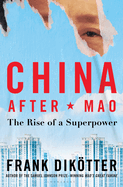
From Frank Dikötter (The Tragedy of Liberation; Mao's Great Famine), Dutch author of numerous books on China and Chair Professor of Humanities at the University of Hong Kong, comes China After Mao, a compelling and informative account and analysis of Chinese history from the early 1970s to 2022. The book--part historical narrative, part palace-intrigue drama and part academic study of China's economic development--is a barbed critique of the Chinese Communist Party (CCP) and much of recent American policy toward China. Dikötter begins with an engaging "inside baseball" type of narration about the politics of the CCP's internal succession as Chairman Mao Zedong's health was failing. The book then blossoms into a macroeconomic chronicle of China's development. Dikötter assembles a wide array of statistics to analyze and understand China's extraordinary growth from the 1980s through the 2010s, blending official government data--the veracity of which he consistently questions--with third-party information, perspectives from Chinese dissenters and candid observations from sources within Chinese society.
Dikötter acknowledges the country's incredible transformations, while also reiterating, in near-uniformly critical fashion, what does not change: the CCP's enduring one-party command of politics and economics; endemic corruption; economic growth as measured in aggregate wealth and big infrastructure without regard for distributed prosperity or environmental health; disdain for human rights; and a strict commitment to the stability of the revolutionary government founded on Marxism-Leninism with Chinese characteristics--i.e., Maoist thought. Although many readers might find fault with some or all of Dikötter's theses, China After Mao is packed with intrigue and insight for the layperson and scholar alike. --Walker Minot, freelance writer and editor

